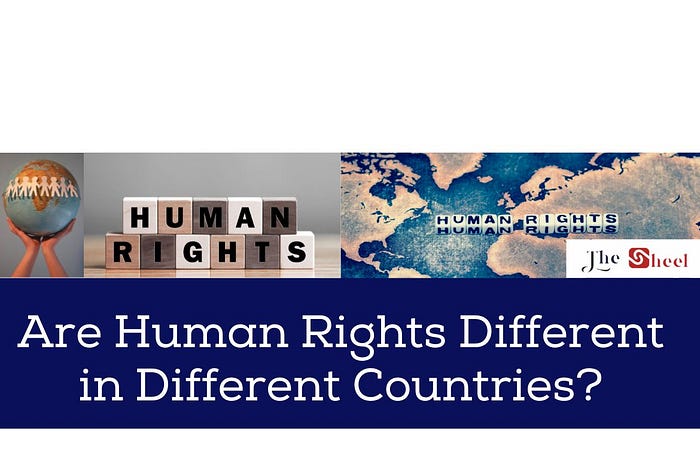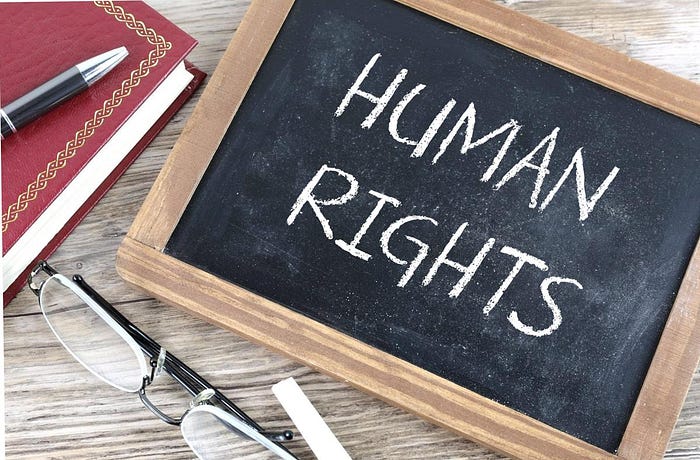
The United Nations mentions 30 specific human rights in its Universal Declaration of Human Rights, which means that those rights must be given to every individual irrespective of their country of origin. However, any human rights debate is always a subjective topic in different countries.
Are human rights different in different countries? While most countries agree upon universal human rights, they do not observe those rights. In the US and other first-world countries, free speech is always a human right, but this is not true in states like North Korea and others. The same is true for other rights.

Why Are Human Rights not Universal?
In theory, human rights are universal, but in reality, this does not happen. Not all countries have the same type of human rights in the modern-day world.
The United Nations has developed a universal framework of human rights that outlines all the rights which should be given to the people of the world. However, many countries are not offering those rights to their people. For instance, freedom of speech is a fundamental human right in countries like America and is even protected by the constitution of the country.
However, in countries like Iran, North Korea, Russia, China, and Saudi Arabia, free speech is considered a luxury and not a right. Similarly, freedom of expression is another human right that is universal in theory but not in practice.
For instance, recently, a young lady died in police custody in Iran, allegedly tortured for not wearing her scarf correctly. The death led to massive protests in Iran. But this is not true in developed nations.
Another example is the difference in the lifestyle of different nations. For example, citizens of developed nations have much higher standards of living than those in poor or war-torn countries and can enjoy more basic human rights like access to food and clean water. Additionally, people in third-world countries often face more significant human rights violations, including government oppression, violence, and poverty.
What are the things that can impact the availability of human rights in any country?
The concept of human rights is a hotly debated topic. Some argue that all individuals are entitled to certain basic rights and protections simply by virtue of being humans, while others claim that these universal human rights may vary from country to country. Factors such as economic development level, cultural background, and political system impact how people experience and access their human rights.
In first-world countries like the United States, Canada, and Western Europe, individuals are typically able to fully exercise their rights to freedom of speech, with few limitations on what they can say or publish.
These countries are also typically more open and accepting of diversity, with laws that protect against discrimination based on race, ethnicity, gender, sexual orientation, and other factors. The right to freedom from state-sponsored violence is also well-established, with strict rules around the use of force by police officers and military personnel.
However, in many third-world countries, such as those in sub-Saharan Africa and parts of Asia, fully exercising human rights is not always possible. For example, political dissent may be harshly punished in some nations through execution or imprisonment without trial.
Additionally, due to high poverty levels and limited access to education and healthcare services in these areas, individuals often have difficulty accessing their basic human rights. Furthermore, many of these countries lack strong laws protecting against discrimination and violence, making it more difficult for marginalized groups such as women, minorities, or members of the LGBTQ community to enjoy full equality.
How Can the Human Rights Situation be Improved in Poor Countries?
Given the prevailing disparity between first and third-world countries in terms of human rights protections and access, what can be done to improve conditions for all individuals around the world?
Many would argue that one way to promote better human rights is through increased international cooperation and aid. For example, wealthier nations could provide resources, technical expertise, and training to help struggling nations develop stronger institutions and build robust legal frameworks that protect individual rights.
Similarly, steps could be taken at a grassroots level by promoting awareness about both universal rights and local issues that directly impact human rights in specific countries.
While the idea of universal human rights may be ideal, it is clear that we still have a long way to go before all individuals can enjoy these fundamental rights and protections, regardless of where they live. However, by continuing to raise awareness about the challenges faced by people living in developing nations and working together to find solutions, we can take important steps toward achieving this goal.
What is the role of human rights organizations in third-world countries?
One of the central roles played by human rights organizations in third-world countries is to advocate on behalf of those who are experiencing or have experienced violations of their human rights. For example, Amnesty International provides support for individuals and groups that governments or other powerful entities have unjustly treated.
This organization was founded in 1961 and has become an immensely influential international movement dedicated to ending global human rights abuses.
Despite these efforts, however, there are widespread problems concerning access to human rights in many poor and developing countries. In particular, it seems that people living in poverty are especially vulnerable when it comes to human rights issues.
This vulnerability may come from the withholding of freedom of expression, freedom from arbitrary arrest and detention, freedom of religion, education rights for all children, equality before the law, economic rights such as access to adequate food and healthcare, and many others.
There are several potential explanations for these disparities in access to human rights. For one thing, first-world countries tend to be wealthier overall due to better economic policies that promote growth and job creation.
Additionally, they tend to have more stable political systems with independent judiciaries that can uphold the rule of law. These factors contribute significantly to empowering citizens who might otherwise be marginalized or repressed by authoritarian governments or other powerful groups.
However, this is not to say that no attempts are being made in third-world countries to improve their human rights situation. In fact, there are many individuals and organizations working hard on the ground to address these issues and advocate for meaningful change.
Freedom of speech in North Korea vs. the West: A Case Study of Universal Human Rights Violation
There is no freedom of speech in North Korea, one of the world’s most notorious human rights violators. In fact, expressing dissenting opinions or criticizing the government can often result in imprisonment or execution. The citizens are strictly monitored, and the regime quickly punishes any expressions that contradict the official state narrative.
In North Korea, there is very little access to outside information, including news from other countries. Thus, the vast majority of people have only limited knowledge about what is happening beyond their country’s borders.
This lack of knowledge severely limits their ability to criticize and question their own government’s actions and decisions. They also do not know much about international standards for human rights and thus do not understand why they are being denied the same rights as people in other countries.
Some North Korean refugees who have escaped to South Korea report that when they were still living in North Korea, their only point of reference for what constitutes human rights was what they saw on state-approved TV or heard from government propaganda.
Thus, it is not surprising that many North Koreans who escape to foreign countries are initially unable to adjust and adapt to the reality of having complete freedom of speech and expression.
A resident of a first-world country cannot even imagine facing this type of restriction.
Internet Access in Poor Countries: How Poor Countries Violate Basic Human Rights
While the internet is a powerful tool for communication and collaboration, it is often inaccessible to people in poor countries due to economic or political factors. For example, by the end of 2020, only 28% of people in sub-Saharan Africa were connected to the internet.
This disparity stems from a number of factors, including low incomes, limited bandwidth, and restricted access to infrastructure. Additionally, there are many governments that actively monitor and censor content on the internet as a way to exert political control over their citizens.
One possible solution to this problem would be for governments and international organizations like the UN or World Bank to increase investments in improving internet connectivity in poor countries. For example, many tech companies have teamed up with local internet service providers to develop innovative solutions for low-income households, such as providing subsidized internet access at schools or libraries.
Likewise, many non-profit organizations are working to increase the reach of the internet by teaching digital literacy skills, helping local businesses build web presences, and advocating for policies that support universal connectivity.
While these efforts will take time to implement fully and also have some challenges of their own, they represent an important step toward ensuring that all people can enjoy the benefits of connectivity regardless of where they live.
Final Thoughts
In a utopian world, human rights are universal and should be afforded to all people regardless of race, gender, or socioeconomic status. However, there are clear differences in access to human rights in different parts of the world, and this is something we must work to change. It is not a viable approach to stand idly by while millions of our fellow human beings suffer. Rather, we need to take action through advocacy efforts and other means to improve the lives of everyone who calls this planet home.
https://www.thesheel.com/are-human-rights-different-in-different-countries/?feed_id=468&_unique_id=6351966ba4cd4
